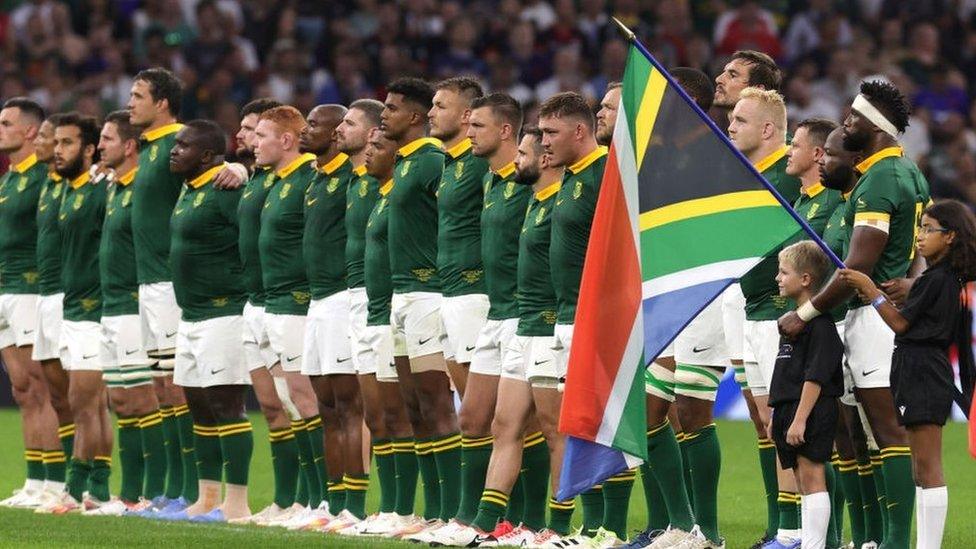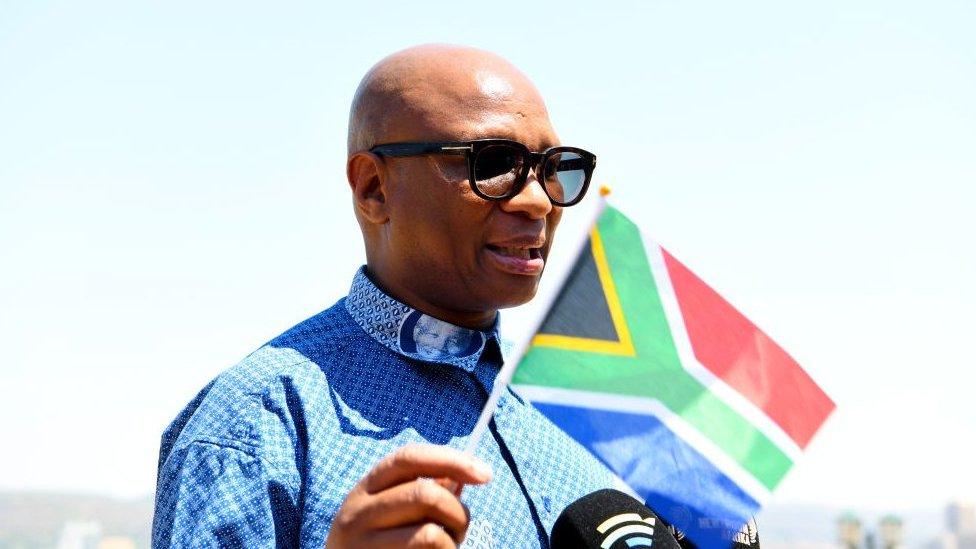South Africa seeks to avoid World Cup flag embarrassment as deadline on anti-doping laws looms
- Published

South Africa, who are currently defending their Rugby World Cup title in France, could have to play without their national flag if Wada impose sanctions on the country
The South African Institute for Drug Free Sport (Saids) intends to lodge an appeal with the Court of Arbitration for Sport (CAS) against the threat of sanctions following the country's failure to update its anti-doping legislation.
The World Anti-Doping Agency (Wada) could impose punishments on South Africa including a ban on the country's national flag at major sporting events.
The country would also be prevented from hosting, or bidding to host, international competitions, among several other punitive measures.
South Africa, along with Bermuda, has been given until 13 October by Wada to comply, but this would be impossible given the extensive process involved in putting the legislation into effect in this country.
The Springboks and the Proteas are currently participating at the men's rugby union and cricket World Cups in France and India respectively.
The hope is that the appeal to CAS would provide breathing space for the South African government to prevent its internationally renowned sports teams from suffering major embarrassment on the international stage.
Is the 2027 Women's World Cup bid at risk?
The bid by the South African Football Association (Safa) to host the 2027 Fifa Women's World Cup is also potentially in danger if the Wada sanctions come into effect.
Safa has to submit its bid to Fifa on 8 December, along with Brazil and the joint bids of the USA and Mexico and Belgium, the Netherlands and Germany.
Litha Mpondwana, spokesperson for Sports Minister Zizi Kodwa, told BBC Sport Africa that the South African government is continuing deliberations with Wada over the issue.
"Efforts to expedite the promulgation of the new bill that would make us compliant are also ongoing," he said.
"There will be an announcement early next week on our next course of action. Everything is on the table including the option of appealing."

The office of Zizi Kodwa, South Africa's minister of sports, arts and culture, says discussions are ongoing with the World-Anti Doping Agency
Saids, which is the country's signatory to Wada's code, was officially informed on 23 September that it was in breach and was given 21 days to comply.
The current legislation, which was passed in 1997 and updated in 2006, does not comply with Wada's latest code which was updated in January 2021.
Khalid Galant, Chief Executive Officer of Saids, denied there had been any tardiness in meeting the Wada deadline.
"We were informed last October to amend the legislation and had already started working on the process a year earlier," he told BBC Sport Africa.
"The plan was to repeal the legislation and to replace it with sports integrity legislation that would also include independent arbitration, dispute resolution, anti-corruption and match-fixing.
"We were hoping to use this as an opportunity to repeal and improve the legislative landscape in terms of sport for South Africa.
"We informed Wada about our plan to implement comprehensive changes to the legislation. They weren't interested in that, all they were interested in was for us to amend certain technical matters within a specific timeline.
"So we had to switch our focus from public participation to getting the legislation passed to meet the timelines."
According to Mr Galant, the South African cabinet approved the amended bill at their fortnightly meeting last week.
"The process is being expedited. We're hoping the amended legislation will be promulgated before the current parliament ceases before the elections early next year.
"Our current legislation is from 1997 so obviously the definitions of what is a positive test and all the different anti-doping violations were very different then to what it became in 2021."
Mr Galant revealed that the SA Sports Confederation and Olympic Committee (Sascoc) and the national federations all supported lodging an appeal with CAS against the Wada sanctions.